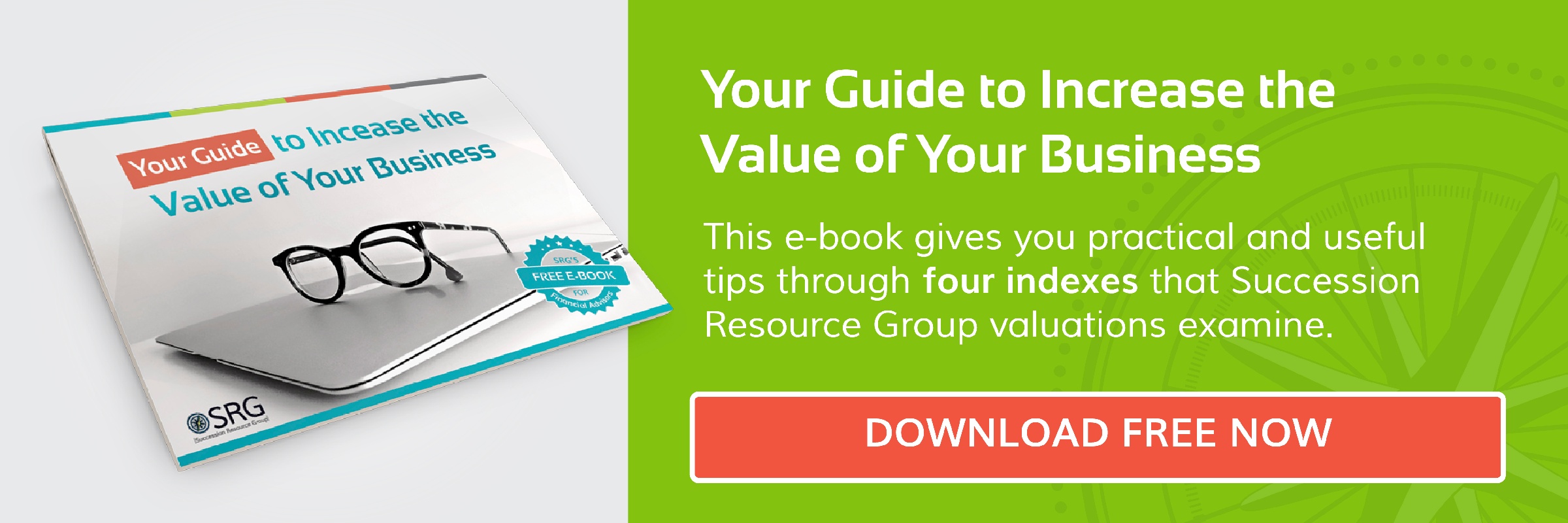There are many complicated facets to running a service-based business, but the most vital component are the relationships you build every day. These relationships are the basis of value, and, for most, your business is your largest and most valuable asset. The most frequently discussed factors that impact the value of your business are profitability, how consistent your revenue is and the growth rate of the practice.
While these are important factors relating to the value of a service-based business, what you may not be aware of is that some of the biggest detriments to the value of your business are related to you. The following is a brief list of true/false statements you should ask yourself to help assess the value of your business:
- (True/False) Your branding is tied to you/your name (website, business cards, etc.)
- (True/False) You are the primary “rain maker” bringing in business
- (True/False) Your clients primarily work with you
- (True/False) You make the investment recommendations for your clients
- (True/False) Your employees love working for you
- (True/False) You solve your client’s and employee’s problems
Most advisors are not consciously aware that there is an inverse relationship with these statements when it comes to your business value. The more statements you answered “True” to, the more difficult it is to transfer your business, increasing risks to a buyer, and therefore, driving your business value down.
If any or most of these statements describe you and your business, don’t fret. The first step is awareness. The second step is taking action. To remedy these issues, the following summaries illustrate how each statement can negatively impact your business and the solutions for you to consider.
Personal Branding
Issue: Your name and reputation is your brand early on, but neither of these things are transferable and will hurt your value when you are ready to exit the business.
Solution: Create a brand that captures the essence of who you are and what you do, but that can transcends your tenure as founder/owner. In a personal service business, the business is already tied to you – separating the branding from you will help the value because your eventual successor can continue to leverage your branding to create client continuity. You will know you have accomplished something positive when someone asks your clients “who manages their money” and they say your company’s name versus your name.
Business Development
Issue: Your business’s ability to grow is dependent on you bringing in new business.
Solution: Ensure you have diversified lead sources that are not all dependent on you. As you hire and train, don’t expect to hire a ‘rainmaker’ – instead focus on the underlying skills required that you can nurture with training and shadowing.
Client Service
Issue: You handle all or the majority of client interaction and rely on your team for ‘behind the scenes’ support and meeting preparation.
Solution: Develop systems and procedures and work to document these processes. Institutionalizing your workflows will help ensure you have more consistent client delivery and allow your staff to take on more client-facing work.
Investments
Issue: You are the sole decision maker for your clients’ investment recommendations.
Solution: Focus on scalability and decide whether you want to take care of clients or manage money. If you are great at bringing in new clients and providing them Ritz Carlton® level service, then partner with a third-party for money management and keep your focus on what you are great at. If managing the assets is your expertise/passion, ensure your investment decisions and models are scalable, replicable, and well documented.
Loyal Staff
Issue: If you are the ‘glue’ that binds the team, consider what happens when someone else is sitting in your chair someday.
Solution: Work to identify the things your employees value most about work with you and your company, and try to institutionalize them so the culture you’ve built can continue beyond your tenure. A team that treasures their job and working for you is incredibly rewarding as a business owner.
Chief Problem Solver
Issue: No one will ever care more about the business than you, which is why you naturally fill the role of Chief Problem Solver for your staff and clients.
Solution: This dependency can potentially paralyze your operation whenever you are out of the office, or if you leave the company someday. As your team expands, strive to let your team figure out solutions on their own, even if that means letting them stumble. It’s the same process you had to go through.
As you grow, a key in building a valuable enterprise is to understand that in a personal service business, you must work to implement systems and processes to ensure the business can someday operate without your direct involvement. It is important to note that building a business, versus a book-of-business, does not require a large team of partners and $1 billion+ in AUM like many advisors might assume. It simply requires your attention and awareness to assemble a team that complements each other, and that your clients have the confidence in the team that serves them.
Solo practitioners can accomplish this same feat with proactive planning and starting with the end in mind. Know that you will someday leave your business and ask yourself this one question every year, “If I had to leave the business today, for whatever reason, could someone step into my office and run this thing, or would the ‘wheels’ fall off without me?” Solving for the six issues discussed here will help ensure that the goodwill with clients is with the business and not YOU. That way if something unforeseen happens to you the business will have the highest probability of succeeding without you.
Explore more Valuation content.

